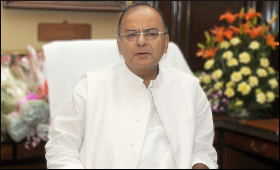|

|
FM warns of delay in GST roll-out if bill sent to house panel
|
|

|
|
| Top Stories |
 |
|
|
|
SME Times News Bureau | 06 May, 2015
Commending the Goods and Services Tax (GST) Bill, 2014 for the Lok Sabha's consideration and passing, Finance Minister Arun Jaitley said on Tuesday that referring it back to the Standing Committee would result in missing the target deadline for its implementation next year, despite the broad consensus already achieved.
"Barring some issues, there is a broad consensus (on GST), majority of parliament is involved. All states, including Orissa (Odisha) and West Bengal, from day one are going to be beneficiaries," Jaitley told the lower house.
"For two years it has been with the Standing Committee. If parliament wants to further delay GST, the April 2016 deadline will be lost and the whole financial year will also be lost," he added.
The government is trying to implement the new GST bill before April 2016.
The bill was taken up for consideration in the lower house after the speaker rejected opposition demands to refer the measure to reform the country's indirect tax system to a parliamentary standing committee.
In the over half-an-hour procedural wrangle, opposition members insisted that the 122nd Constitutional Amendment Bill be referred to the parliamentary committee as it was a new bill as opposed to the one brought by the previous UPA government.
Lok Sabha Deputy Speaker M.Thambi Durai informed the house that Jaitley had written last year asking for the bill not to be referred to the Standing Committee on Finance on the ground that the earlier bill brought by the then UPA government in 2011 had already been pending for long with the house committee.
The finance minister had told a news channel on Monday that there is broad consensus on the GST bill and he has tried to allay the apprehensions of opposition members that there will be revenue losses to states upon its implementation.
"I have convened several meetings of state finance ministers. I have spoken to most political parties and broadly there is a large consensus," he said.
Seen as a key to facilitate industrial growth and improve the business climate in the country, the GST bill, which involves a constitutional amendment, needs to be passed by a two-thirds majority in both houses of parliament and by the legislatures of half of the states in the country to become law.
By subsuming most indirect taxes levied by the central and state governments such as excise duty, service tax, VAT and sales tax, the GST proposes to facilitate a common market across the country, leading to economies of scale and reducing inflation through an efficient supply chain.
To help states in the transition phase of implementing GST, the government has proposed the levy of an additional tax on inter-state trade on goods of up to one percent and kept out petroleum products from its purview till later.
The bill also proposes that compensation to the states for loss of revenue owing to GST may be extended to five years, Jaitley told the Rajya Sabha on Tuesday in a written reply.
"Levy of an additional tax of goods, not exceeding one percent in the course of inter-state trade or commerce to be collected by the government of India for a period of two years, and assigned to the states from where the supply originates," he said.
In the case of petroleum and petroleum products, it has been provided that these goods will not be subject to the GST levy "till a date notified on the recommendation of the Goods and Service Tax Council".
The union cabinet has recently approved payment of compensation to states for the loss they would incur on account of a reduction in the central sales tax from 4 percent to 2 percent for three years from fiscal 2010-11.
Finance ministry sources said preliminary estimates indicate that Rs.33,000 crore could be the amount payable to states and union territories for the entire period, and settling these claims will help create an enabling environment for rollout of the new regime.
|
|
|
| |
|
|
|
|
|
|
|
|
|
|
|
|
|
|
| |
| Customs Exchange Rates |
| Currency |
Import |
Export |
US Dollar
|
66.20
|
64.50 |
UK Pound
|
87.50
|
84.65 |
Euro
|
78.25
|
75.65 |
| Japanese
Yen |
58.85 |
56.85 |
| As on 13 Aug, 2022 |
|
|
| Daily Poll |
 |
 |
| PM Modi's recent US visit to redefine India-US bilateral relations |
|
|
|
|
|
| Commented Stories |
 |
|
|
|
|
|
| |
|